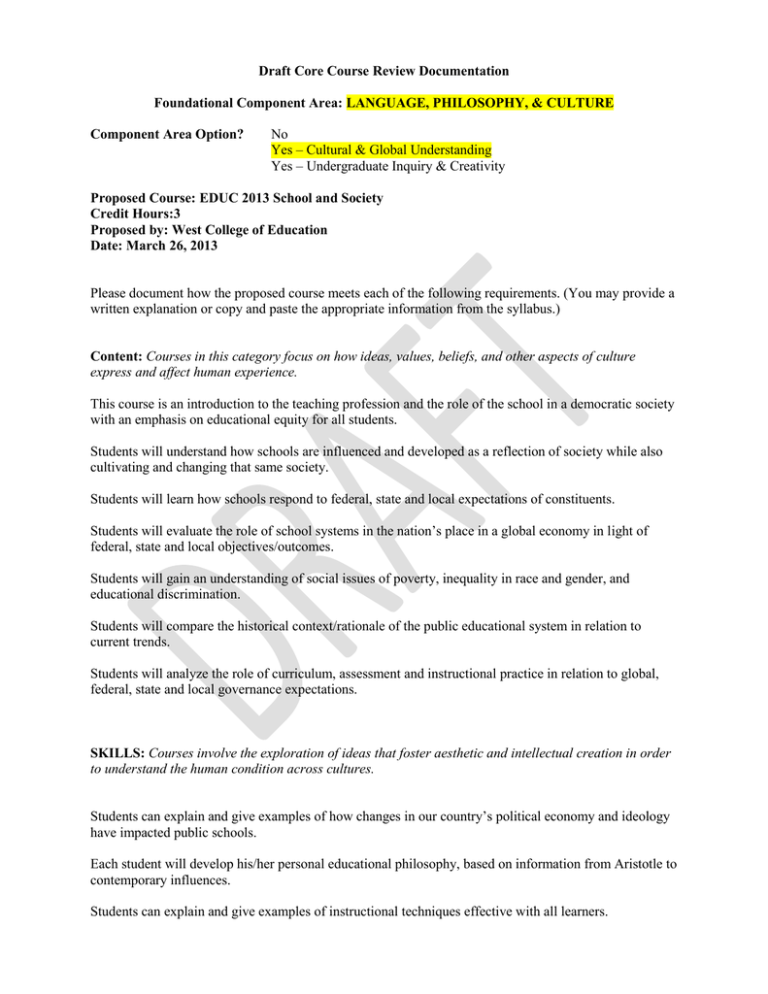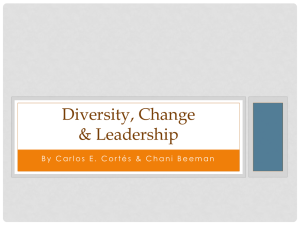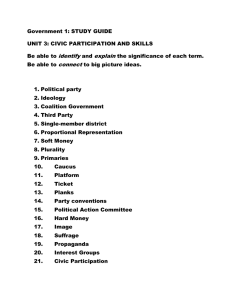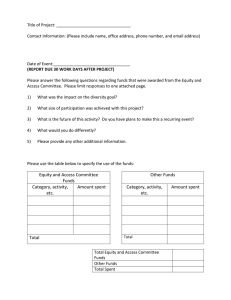Document 17852972
advertisement

Draft Core Course Review Documentation Foundational Component Area: LANGUAGE, PHILOSOPHY, & CULTURE Component Area Option? No Yes – Cultural & Global Understanding Yes – Undergraduate Inquiry & Creativity Proposed Course: EDUC 2013 School and Society Credit Hours:3 Proposed by: West College of Education Date: March 26, 2013 Please document how the proposed course meets each of the following requirements. (You may provide a written explanation or copy and paste the appropriate information from the syllabus.) Content: Courses in this category focus on how ideas, values, beliefs, and other aspects of culture express and affect human experience. This course is an introduction to the teaching profession and the role of the school in a democratic society with an emphasis on educational equity for all students. Students will understand how schools are influenced and developed as a reflection of society while also cultivating and changing that same society. Students will learn how schools respond to federal, state and local expectations of constituents. Students will evaluate the role of school systems in the nation’s place in a global economy in light of federal, state and local objectives/outcomes. Students will gain an understanding of social issues of poverty, inequality in race and gender, and educational discrimination. Students will compare the historical context/rationale of the public educational system in relation to current trends. Students will analyze the role of curriculum, assessment and instructional practice in relation to global, federal, state and local governance expectations. SKILLS: Courses involve the exploration of ideas that foster aesthetic and intellectual creation in order to understand the human condition across cultures. Students can explain and give examples of how changes in our country’s political economy and ideology have impacted public schools. Each student will develop his/her personal educational philosophy, based on information from Aristotle to contemporary influences. Students can explain and give examples of instructional techniques effective with all learners. Each student can explain and give examples from the Texas Beginning Educator Support System (TxBESS). Students can explain and give examples from the Texas Code of Ethics and Standard Practices for Professional Educators. Students can compare and contrast learner centered instruction to teacher centered instruction and explain the differences. Each student can explain the desirability of equity in the classroom. Students will become informed advocates for choices and differentiation assignments in the classroom. When presented with current issues, students will encourage an analysis of both sides of the issue. ASSESSMENT OF CORE OBJECTIVES: Assessments should be authentic, intentional and direct. The following four Core Objectives must be addressed in each course approved to fulfill this category requirement: Critical Thinking Skills - to include creative thinking, innovation, inquiry, and analysis, evaluation and synthesis of information Current Events - Investigate and compare four current education events in the U.S. and somewhere else in the world and determine how they impact education. Use online English language newspapers and news media to find articles to compare with U.S. articles (Beijing Daily News, London “The Times,” Arab News, e.g.). Specifically, write a 500 word blog post for each event comparison with your answers to the four questions about the topic: 1. Summarize the two articles. What were they about? 2. Compare the articles and explain the similarities and differences to U.S. students, schools, and society? 3. What are your reactions to the articles? What did you learn? 4. How did the comparison of articles influence you as a future teacher or as an informed advocate of education? Respond to two peer blog posts with a substantial and thoughtful response that raises more questions about the issues addressed. Communication Skills - to include effective development, interpretation and expression of ideas through written, oral, and visual communication Field Experience Report - Students are required to complete 6 hours of observation at a school setting: 2 hours in an elementary school, 2 hours in a middle school, and 2 hours in a high school. Students are required to report on topics related to areas of discussion outlined in the content objectives of the course. Students may provide positive or negative examples, supporting either one with evidence, of social equity issues, learner centered versus teacher centered instruction, conditions of curriculum/assessment issues related to state mandates or other topics identified as content or skill. Students analyze and connect their future careers as educators or informed advocates of education to civic service in education Students demonstrate their understanding of the need for civic action in education in a democratic society. Personal Responsibility - to include the ability to connect choices, actions and consequences to ethical decision-making Students present their final multimedia project that is a synthesis of all their activities exploring schools and society in this course. Students explain how they envision their ongoing civic duty and engagement with education through their work and family life. Social Responsibility - to include intercultural competence, knowledge of civic responsibility, and the ability to engage effectively in regional, national, and global communities Students will examine the role of poverty, race, gender, and discrimination of America and selected countries by gathering and collating an annotated library of 12 online resources that address the need for equity on these matters. Students will collaborate in small groups using Diigo, an online collaborative social tagging and reference tool. Students will interview their own families/friends about the purpose of education and write a synthesis of their responses to be shared with the class in asynchronous or synchronous discussion. Students will develop a draft philosophy of education that synthesizes all of their experiences in the course. ADDITIONAL INFORMATION: Provide any additional information supporting course inclusion in the core (optional). PLEASE ATTACH THE FOLLOWING 1. Syllabus 2. Assessment for Critical Thinking Skills 3. Assessment for Communication Skills 4. Assessment for Personal Responsibility 5. Assessment for Social Responsibility



